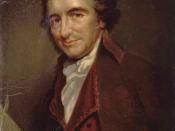Going back to the 1700s the American colonies were profoundly affected by several ideas which heavily influenced the colonies and lead them towards revolution. Common Sense, the Enlightenment, and also the Bacon's Rebellion were some of the most significant events that spread ideas for independence.
The pamphlet, Common Sense, published by Thomas Paine in January 1776 is arguably the most successful political essay in American history. Paine was against monarchy and hereditary succession for he believed no one by birth could have a right to set up his own family in perpetual preference to all others for ever, and though himself might deserve some decent degree of honors of his cotemporaries, yet his descendants might be far too unworthy to inherit them. Paine's interpretation of the British was a disapproving one. He wanted the colonists to understand that they did not have to accept restraint from the British. He wanted them to trust in themselves and be independent from Britain which had nothing more than them! It made no sense, in Paine's mind, for a small country like Britain, an island, to rule a continent like America.
Independence would foster peace and prosperity. An independent America would grow rich by trading with all countries, not just the mother country. This were the ideas that Thomas Paine gave to the colonists in order to push them towards revolution, but the Enlightenment also played an important role in leading American colonies to Independence.
The Enlightenment thinkers, such as John Locke, believed in the powers of humankind and saw themselves as part of a revolutionary development in history that would replace superstition and tired rituals and corrupt traditions with reason and productive energy. Some of the values of Enlightenment included believing in the essential goodness of human nature, trusting the emerging of modern...



Guys!!!!!
POINTS aren't EVERYTHING!!!!!! How many times do I have to say that!!!!????? Plagiarising work is just pathetic and illegal too. Imagine if someone plagiarised YOUR original work... how would YOU feel?
3 out of 3 people found this comment useful.